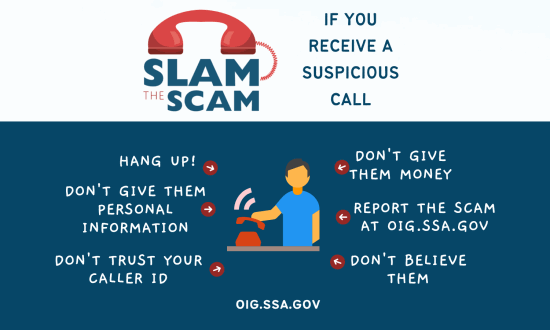Consumers lost hundreds of millions of dollars to government imposter scams last year alone!
Chances are someone you know has received an ominous call or message from someone pretending to be from the government, alleging that your information has been compromised or demanding immediate payment. Ignore it. This is just one of the tips that the Social Security Administration Office of the Inspector General (SSA OIG) is sharing to warn consumers about these scams through a National Slam the Scam Day initiative taking place March 10, 2022.
Slam the Scam Day is an initiative to raise public awareness of the pervasive scams that continue to plague the nation and is part of the Federal Trade Commission’s National Consumer Protection Week, (NCPW) happening March 6-12, 2022. The initiative, which began in 2020 to combat Social Security-related scams, is now expanding to include other government imposter scams. In a government imposter scam, someone claims to be an SSA, or another government employee, and may ask for personal information, demand payment, or make threats. These scams primarily use the telephone, but scammers may also use email, text messages, social media, or U.S. mail.
Tips for spotting scams is a major thrust of this year’s campaign. SSA OIG partners with other government agencies, non-profit organizations, and the private sector to increase awareness about how to spot government imposter scams and avoid becoming a victim. According to the Federal Trade Commission (FTC), from January through September 2021, consumers lost more than $331 million dollars to government imposter scams.

“As we continue working with our law enforcement partners and partners from the private sector to combat these sinister schemes, I urge consumers to simply hang up the phone, or delete suspicious texts and emails, without responding to the scammers,” Inspector General Ennis said. “That is the easiest and most effective way to avoid falling prey to these vicious scams.”
“We are concerned that fraudsters continue trying to trick people into providing personal information or money,” said Kilolo Kijakazi, Acting Commissioner of Social Security. “I urge people to remain alert, hang up if a scammer calls, and ignore their attempts if you receive a suspicious email, text, or letter.”
SSA OIG provides resources on its website and posts tips and warnings on social media platforms. There will be webinars and social media chats to give the public information that empowers them to Slam the Scam.
SSA OIG urges everyone to be cautious of any contact supposedly from a government agency telling you about a problem you don’t recognize and provides the following tips.
Real government officials will NEVER:
- Threaten arrest or legal action against you unless you immediately send money;
- Promise to increase your benefits or resolve a problem if you pay a fee or move your money into a protected account;
- Require payment with gift cards, prepaid debit cards, wire transfer, Internet currency, or by mailing cash; or
- Try to gain your trust by providing fake “documentation,” false “evidence,” or the name of a real government official.
The public is encouraged to report Social Security-related scams and fraud online at https://oig.ssa.gov. Other government imposter scams may be reported to the Federal Trade Commission https://www.ftc.gov/scams.
Scammers frequently change their approach, trying new tactics and messaging to trick people. We encourage you to stay up to date on the latest news by checking out our Security Center.